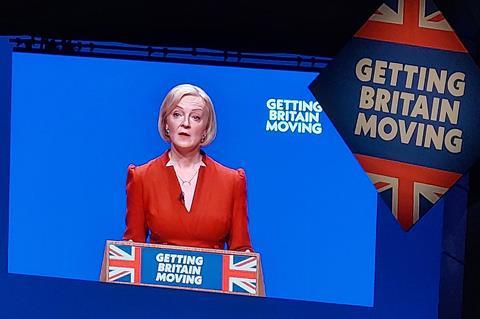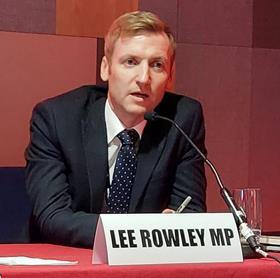Architectural editor Ben Flatman had a ringside seat at this month’s Conservative Party conference. This is what he saw and heard

When historians look back at this year’s Conservative Party conference in Birmingham, it won’t be the U-turns and in-fighting that grab their attention. What marks out this conference from all the others is that, for the first time since the 2016 referendum, the true economic and ideological implications of Brexit are becoming apparent.
Boris Johnson, who was never a true believer, only jumped on the bandwagon in order to advance his own career. Having won the referendum and (eventually) got his hands on the keys to No10, he showed little interest in exploring what Brexit actually meant. His government ploughed on as if nothing much had changed.
This is no longer the case. Although she herself campaigned for Remain, Liz Truss is ideologically closely aligned with the fundamentalist economic libertarians who saw Brexit not as an end point, but as the beginning of a revolution. Their analysis had always been that the UK (and EU) were on a long-term trajectory of relative decline compared with the US and Asia. They believed that only by decoupling the UK from its trading partners in the EU and refocusing on export-led growth with the rest of the world could Britain rebound.
Their goal is to cut what is left of the public sector and national institutions and push for an ever more unrestrained hyper-capitalism. And they believe that what British business needs to flourish in this context is nothing more than tax cuts and deregulation.
Brexit and the coronavirus have choked off the supply of cheap skilled labour from the EU
Kwasi Kwarteng’s financial statement was the opening salvo in this revolutionary struggle. And although he has been forced to row back on the 45p rate cut, the bulk of his agenda remains intact. If the government can cling on, the coming months are likely to see a blitz of policy announcements, possibly including the loosening of greenbelt restrictions.
As many have pointed out, none of this was in the Tory’s 2019 manifesto. Few, beyond a small coterie of right-wing policy wonks, believe it is likely to deliver the long-term structural improvements the economy needs to grow sustainably. As Michael Heseltine said during a fringe event at the conference, “There is no short cut to miracle growth”.
At best, Kwarteng and Truss may deliver a short-term boom, of the type that the Tories engineered in the early 1970s and late 80s, both of which were followed by notable busts and long, painful hangovers. Critically, after those supply-side engineered growth spurts, the underlying and long-term challenges around investment, skills and infrastructure remained unchanged.
Unimpressed by Truss and Kwarteng’s self-congratulatory wonkery, it was clear at this conference that the immediate concern of construction industry leaders was more focused on the bread and butter issues that impact real businesses.
Will the government achieve a miracle where all others have failed?
Brexit and the coronavirus have choked off the supply of cheap skilled labour from the EU, leading to massive skills shortages and putting an immediate break on growth. Far from liberating business, the government’s commitment to throwing the UK’s entire regulatory regime into doubt has caused widespread uncertainty – never a good way to get businesses to invest.
And so the UK teeters on the edge. Will the government achieve a miracle where all others have failed? Or will unfunded tax cuts take the country in an altogether new direction, towards the trajectories of Argentina and Sri Lanka?
Most probably we will end up somewhere in the middle. No further towards addressing the British economy’s underyling structrual weaknesses, and just another wasted decade further down the line of relative decline.
These are my takeaways from this year’s conference:
Confusion over levelling up
Many in attendance in Birmingham were wondering what had happened to the government’s levelling up agenda. The cut in the 45p tax rate appeared to be a clear indication that the government was no longer committed to its most recognisable policy slogan. But then came the first of the week’s U-turns and the top rate was back.
Dehenna Davison, the recently appointed minister for levelling up, said: “There’s no way I’d take on the role if I didn’t think [levelling up] was at the core of what this government is going to do.”
Like Davison, Robert Buckland, the secretary of state for Wales, was adamant that levelling up was still a government priority. “It has started,” he said, “and remains at the core of the government.”
Retrofitting: a missed opportunity
Retrofitting and insulating British homes should be a win-win for everyone. Contractors and suppliers get a steady stream of work, while consumers get warmer homes and lower energy bills. And yet this government has singularly failed to rise to the challenge.
There are many Conservatives, including ministers, who share industry’s frustration, but few seem to have any clear strategy for getting things moving.
Defending the government’s performance on net zero in housing – and when asked why we are still allowing houses to be built that will need retrofitting – Scully said the government was “not trying to get to net zero tomorrow. We’re trying to get there by 2050.”
Brian Berry of the Federation of Master Builders said: “I agree this is a nonsense, to still build homes that need to be retrofitted, and it doesn’t make sense. We need to look at other European countries that are ahead of us on retrofit.”
Sandi Rhys Jones, vice-president of the Chartered Institute of Building, spoke of her frustration at the lack of progress. “I find it breathtaking. It’s 50 years since we started talking about loft insulation. We should be better than this.”
She said the workforce needed to be urgently up-skilled and government needed to help create a stable market for retrofit. “There’s a huge need for clarity”, she said. “We need consistency. If this is going to work, this needs consistency.”
She pointed to the Irish “one-stop shop” model, where citizens can get advice on retrofit and get a list of accredited suppliers.
The lack of a unified system of certification for retrofit and competency was highlighted as an issue. And there was support from Berry for targets on retrofitting. He argued that they were the best way to measure progress and retrofit passports would enable owner-occupiers and renters to “log what work has been done”.
If past performance is the best indicator of future results, we may all be waiting some time before we see a fully co-ordinated national effort on this front.
Investment zones to change everything (maybe)
“Investment zones” were the latest policy initiative on the tongues of every government minister. How do they differ from David Cameron’s “enterprise zones” and Johnson’s “freeports”, all much vaunted previous attempts to “get Britain growing”?
Details were scant at the conference but ministers were clear on one thing: this time they would change everything.
“I view investment zones as part of the levelling up agenda,” said Buckland, before going on to argue that – far from representing a tilt towards libertarianism – the new initiative was a continuation of Johnson’s interventionist approach.
Don’t ask Lee Rowley

The newly appointed minister for housing in the DLHUC was everywhere at this conference. But please don’t ask him what government policy is. “By the way, I’m only on day (insert number),” Rowley said at each appearance. “So this is emerging thinking. You might have to come back to me in a few months.”
No end to planning backlog
When I did ask Rowley what his plans were to address the under-resourcing of local authority planning departments, he could offer no more than a commitment that he would “look into” the matter and address it “as and when”. It seems those in the construction industry should not hold their breath for any swift solution to this on-going problem.
Industry needs certainty
There were widespread mutterings of discontent from the big housebuilders. David Thomas, the Barratt Homes chief, repeatedly mentioned the lack of clarity and consistency in government policy as a cause of concern. “We don’t care if targets are set nationally or locally, we just want a system that works,” he said.
Not enough skills
Skills – or the lack of them – were at the top of the agenda for many construction and house building leaders at the conference.
There was collective agreement that more, quality apprenticeships were needed to address the perennial issue of getting young people into construction. “Apprenticeships are a massive tool to get young people into good jobs – you don’t have to go to university to get a great career,” said Paul Scully, the local government minister.
The 1980s weren’t so great after all
Tory conferences were once full of wistful glances back to the halcyon days of the 1980s, when Britain was supposedly booming and riding the crest of the Thatcherite wave. Not so, according to the new prime minister.
“I grew up in the 80s and 90s and saw the boarded-up shops and young people drawn to a life of drugs,” Truss said. Is she so young that she has forgotten which party governed for all but three years of those two decades?
Government wants more SME house builders
There seems to be a growing consensus across the Conservative Party that to drive up volumes, choice and quality, the government needs to be encouraging the return of more SMEs to the housing sector. Gove coruscated the volume builders on Monday. “Many of the large house builders are land investment speculators, not really house builders,” he said.
Speaking of the reasons why so many people seemed to oppose new housing development, he said “design and quality is not prioritised” and that too often planning inspectors “override local objections”.
Elsewhere at the conference, Stuart Baseley, executive chairman of the Home Builders Federation, also talked about how to encourage more SMEs into the sector. “I don’t think we need wholesale strategic planning reform,” he said. “We just need to make the system we have work, rather than tinkering with it.”
Rob Boughton, CEO of residential developers Thakeham Group, bemoaned the endless consultations his company had to go through when taking a scheme through planning and suggested that such processes could be reduced in number and streamlined. It was “hugely costly” he said, and a likely barrier to SMEs entering the market.
The only sustainable way to get more housing is to get communities on side

Samuel Hughes, who was until recently head of research at the Office for Place, made the case for “gentle density” and “suburban densification”. He also argued that the only way to deliver large quantities of new housing in a politically sustainable manner was in a way that “has the support of local communities and restores the environment”.
“We can’t smash our way through local communities,” he said, before advocating for clear-cut design codes over vaguer design guidance.
Elsewhere, Nicholas Boys Smith made the case for “street votes” as a means by which suburban property owners could agree to densify their neighbourhoods, freeing up low density suburbs for talller (although preferably not high-rise) development – and making significant financial gains in the process.
Mayors are the future
This year’s conference was of course in Birmingham, where Andy Street has been the Tory mayor of the combined West Midlands authority since 2017. A former head of John Lewis, he is widely seen as a pragmatic centrist, happy to work across party lines to deliver for the wider region.
The Conservatives were keen to take credit for what they portray as Street’s successes – such as the recent Commonwealth Games – although this might raise eyebrows among many of the Labour-run local authorities that shared responsibility for the event.
As Westminster seems to grow ever more disfunctional, devolved government is providing much needed long term strategic thinking and stability. Whether Labour wins the next general election or the Tories cling on, it seems both parties are unlikely to want to roll back the rise of the elected mayors and this new tier of local government.
















No comments yet